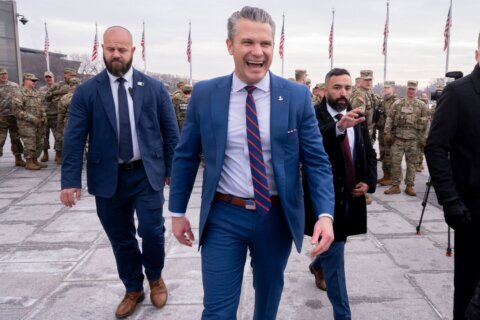This article was reprinted with permission from Virginia Mercury.
Research colleges and universities in Virginia are at risk of taking significant cuts, state lawmakers in the House of Delegates and education experts revealed Tuesday, as the country’s executive branch continues to trim down operations and funding in the federal government.
According to data collected by the National Center for Science and Engineering, Virginia ranks 13th in the nation in research and development (R&D) performance.
“R&D is important to Virginia, and changes in federal R&D funding and policies will have ripple effects on your entire state and the Virginia Public and Land Grant Universities,” Deborah Altenburg, vice president of research policy and advocacy at the Association of Public and Land-Grant Universities (APLU), said to lawmakers on Tuesday in Alexandria.
Altenburg said every member institution of APLU has had at least one grant canceled or delayed and “there’s really no clarity at this point or way to gauge what the full cost of those cuts will be.”
The funding institutions receive for their facilities and administrative costs could also be capped under the changes, which would be “devastating” to the university-based research structure, since it’s the “major driver for our U.S. economy,” she said.
The changes for research institutions come as lawmakers prepare for the wider impacts on Virginia’s federal workforce and funding reductions, following executive actions taken by President Donald Trump‘s administration since taking office in January to cut what they have called “wasteful” government spending.
So far, the number of available private-sector jobs has declined, and contracts have been canceled in Northern Virginia, InsideNOVA reports. The state’s community colleges have also ended DEI admission policies, in light of federal mandates snuffing out diversity, equity and inclusion practices, while the Trump administration has threatened to yank federal funding from schools that don’t end race-based admissions policies.
In response to the federal workforce and funding reductions, the Virginia House of Delegates, directed by House Speaker Don Scott, D-Portsmouth, developed a committee to focus solely on how the changes affect Virginians.
The committee is responsible for collecting data on the potential scope of workforce and funding cuts, and analyzing the likely impacts of the cuts on Virginia’s economy and budget should they be partially or fully realized, according to the speaker’s letter.
The committee is responsible for inviting stakeholders across a wide range of interests to provide their perspectives and recommend solutions to the challenges.
Del. David Bulova, D-Fairfax, the committee chair, said the Trump administration’s decisions will have “significant, if not profound” impacts on Virginia, including on its workforce, the state budget and other key areas.
“The federal cuts are going to have a ripple effect on Virginia’s economy and so we need to be prepared to pivot and fill in that gap before it creates budget shortfalls,” Bulova said.
House committee digs into federal cuts’ impact on Virginia
The committee met in February to plan four meetings in different parts of the state for lawmakers to gather insights from experts on federal workforce and economic impacts statewide and regionally. The first meeting was held Tuesday, at Virginia Tech’s Innovation Campus in Alexandria.
According to the Weldon Cooper Center at the University of Virginia, whose representatives presented at the meeting, Virginia has more federal workers than nearly every other state, and Virginia’s federal workforce is highly educated and concentrated on national security.
The committee also learned about the federal budget process, and the tools the president’s team is using to excise what they deem to be excessive programming, funding and resources.
Rescissions and reprogramming are the Trump Administration’s preferred tools to reduce spending — with Congress support — before invoking the Impoundment Control Act (ICA), according to representatives from Crossroads Strategies during Tuesday’s presentation.
The ICA allows temporary deferral of funds, but not cancellation without Congressional approval.
Uncertainty for research institutions
Lawmakers suggested that Virginia’s research institutions may soon have to begin assessing their grant programs, if more are canceled or even lost. This comes as APLU, the American Council on Education and Association of American Universities and others are fighting against the Trump administration’s decision to cut funds for research projects.
The committee feared institutions may have to raise tuition or limit research to address the potential losses.
“Universities are really in uncharted waters, and each institution will need to make decisions based on their institutions’ resources and risk tolerances,” Altenburg said.
Some of the top federal funding recipients in the commonwealth include the University of Virginia, which received $354.7 million in 2023, followed by Virginia Tech with $282.1 million.
In 2023, Virginia State University also received $7.2 million and $3.5 million to James Madison University. All these institutions are members of APLU.
Del. Bonita Anthony, D-Norfolk, said education is at the “core” of Virginia’s success when developing “highly educated and skilled” federal workers.
“If there’s going to be any type of reductions, it’s going to … crumble the very core of our footprint here in Virginia,” Anthony cautioned.
Altenburg, whose association aims to enhance student success and workforce readiness, advance groundbreaking scientific research, and strengthen economic and community engagement, showed how money from the government supports critical aspects of higher education in the state.
Federal funding, now in jeopardy, has supported a combination of direct expenditures and facilities’ administrative costs, Altenburg relayed. Some of the research and development costs include salaries, stipends and equipment.
Del. Briana Sewell, D-Prince William, who is the chair of the House Education subcommittee on higher education, attended Tuesday’s committee meeting and said afterwards “it is crucial for policymakers to fully understand the consequences these cuts may have on both the accessibility and functionality of these institutions. The insights of educators and administrators are vital in ensuring these challenges are addressed effectively.”
NOVA Community College support
Amid the troubling prospects from federal reductions, the committee also received good news that it hopes to build on across the commonwealth.
On Tuesday, Northern Virginia Community College shared that it recently committed $1 million in scholarship aid to allow eligible unemployed federal workers and contractors to enroll in one of 14 courses at no charge, and to access NOVA-sponsored online workshops on resume-writing and job search techniques.
The initiative, referred to as NOVAnext Partnership, is expected to provide scholarships to 1,000 participants.
Anne Kress, president of Northern Virginia Community College, said it’s a step towards stemming federal workers’ lost jobs statewide.
“This is not the solution. It is part of a solution,” said Kress.
Some of the courses included in the initiative focus on providing certifications in IT specialties, program management and human resources. Other instructional opportunities include online entrepreneurship and a new Generative Artificial Intelligence course.
Eligible students must be federal and contract workers who have been laid off on or after Jan. 24, 2025 and reside within the Northern Virginia service area. The NOVA community college system said participants can also enroll in other courses at a regular tuition rate and may qualify for additional state financial aid.
Kress said in two weeks, the community college system has approved 204 applications. Most of the applications are from those impacted by the cuts at USAID.
Del. Tony Wilt, R-Harrisonburg, applauded the initiative.
“This is exciting, and I would also say it’s amazing to me how, in large part, it mirrors what the state of Virginia has already developed and been doing,” Wilt said, referencing Virginia Has Jobs, the state portal touted by Gov. Glenn Youngkin as a solution for laid-off federal workers.
“It’s great opportunity for us,” Wilt said. “I know we’ve all been concerned about our citizens that have lost jobs and maybe potentially could be coming down the road, but we’ve got good solutions.”
GET THE MORNING HEADLINES.
Virginia Mercury is part of States Newsroom, a nonprofit news network supported by grants and a coalition of donors as a 501c(3) public charity. Virginia Mercury maintains editorial independence. Contact Editor Samantha Willis for questions: info@virginiamercury.com.






